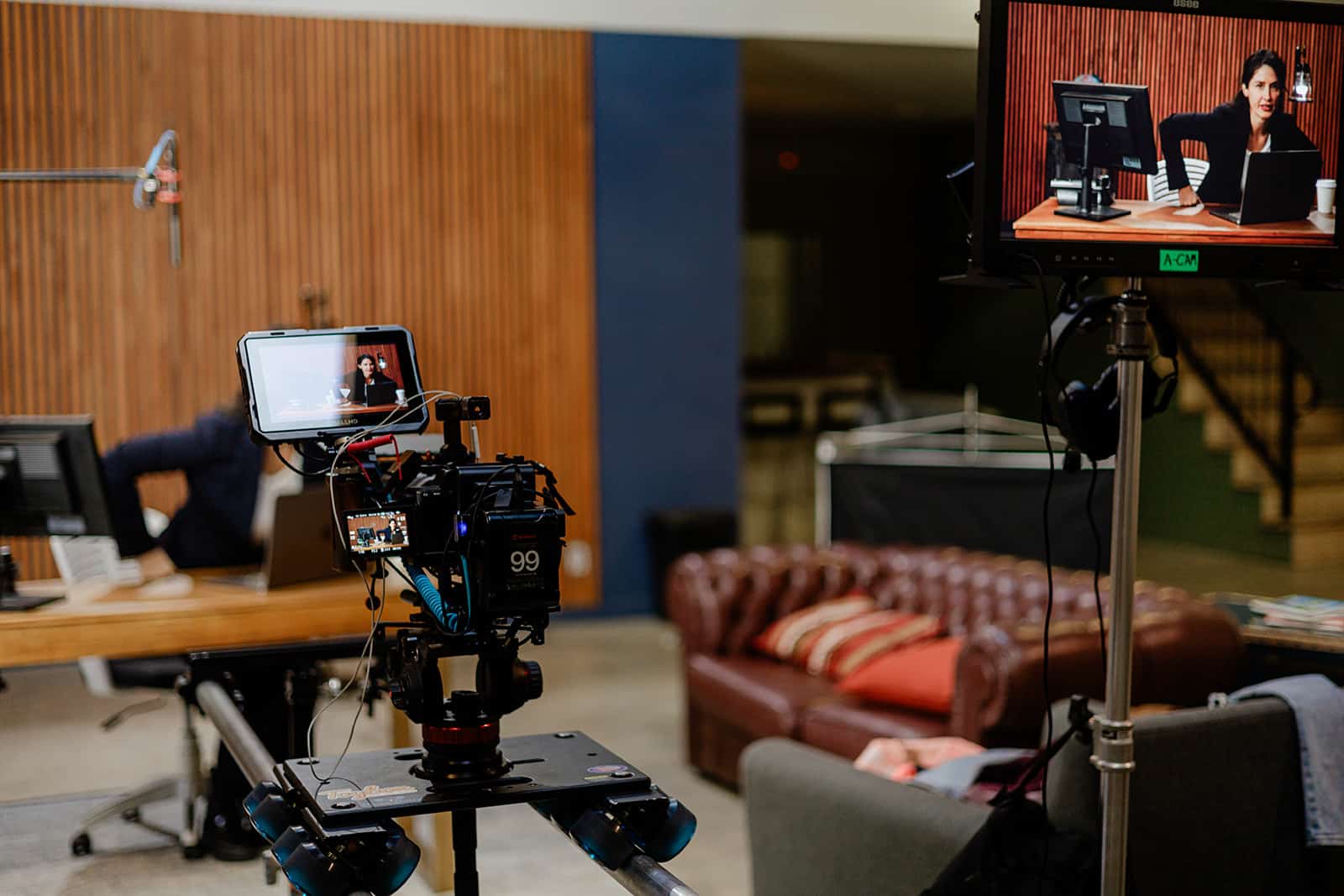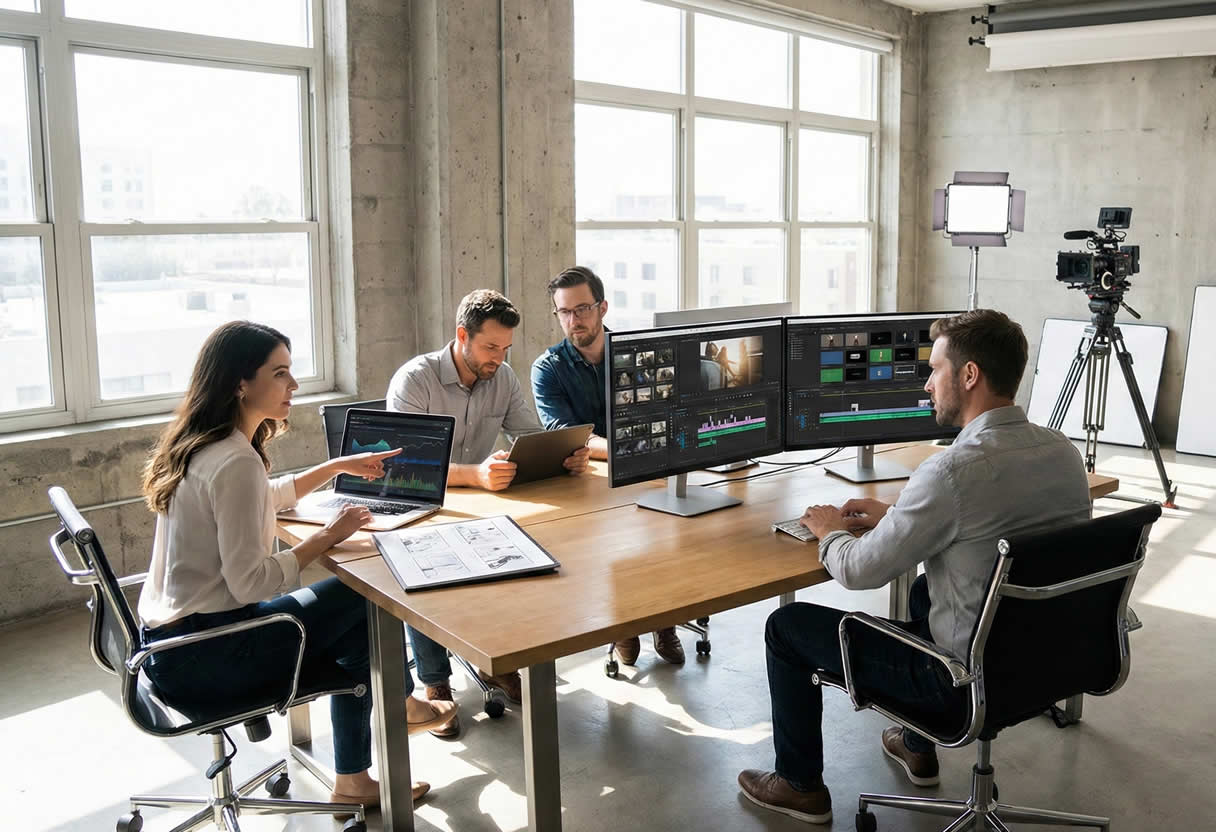What’s the one thing every video production needs but no one talks about? Project management! Welcome to video production management, where every day is a puzzle, and you’re missing half the pieces if you are clueless about how it works.
Video production has become more important for businesses than ever, attributed to its capacity to result in notable engagement. Moreover, it accounts for 82% of global traffic. [Source: Filestage]
Video production projects can be complicated and demanding, requiring
→ Careful planning
→ Coordination
→ Execution
Moreover, effective project management plays a vital role in accelerating video production workflow. It also helps to ensure that the projects are
→ Completed on time
→ Within a budget
→ To the highest quality standards.
Let’s explore the required workflow with a step-by-step approach to successful video production project management.
Pre-Production: Planning for Success
Before the cameras roll, let’s make sure you know where the cameras are! Pre-production is an important stage in video production that sets the foundation for a successful project.
Without pre-production, you’re just rolling the dice with your deadlines. Think of pre-production as the lifeguard keeping your creative waters safe. Through careful planning and organization of efforts, you can ensure your goals and needs.
Relatable Read: The Video Production Process: A Step-By-Step Guide For 2024
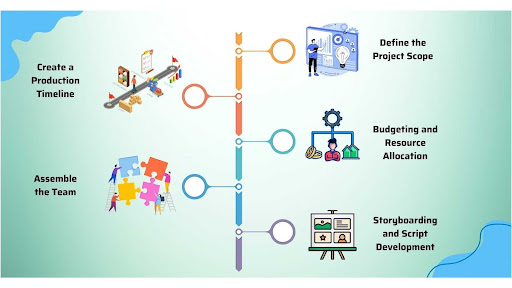
Define the Project Scope
Time to define the project scope because “we’ll figure it out as we go” barely ends well. So the steps of defining the project scope are
- Clearly outline your objectives
What do you want to achieve through your video? Define your goals in terms of:
→ Brand Awareness
→ Lead Generation
→ Storytelling
- Identify your target audience
Who is your audience? Knowing your target audience will help you master your content and the brand voice you want to convey.
- Determine your deliverables
What is the result you are expecting from your video? It might include
→ Views
→ Engagement
→ Conversions
Create a Production Timeline
They say Rome wasn’t built in a day, but with a proper production timeline, we’ll at least know how many days we need! An ideal production timeline needs some steps to follow. Such as:
- Break down the project into stages
Divide the project into small, manageable tasks, like
→ Pre-production
→ Filming
→ Editing
→ Post-production
- Estimate the time required for each stage
Allocate realistic timelines for each task depending on its level of complexity and the resources available.
- Create a schedule
Prepare a detailed schedule that outlines the timeline for each stage of the project.
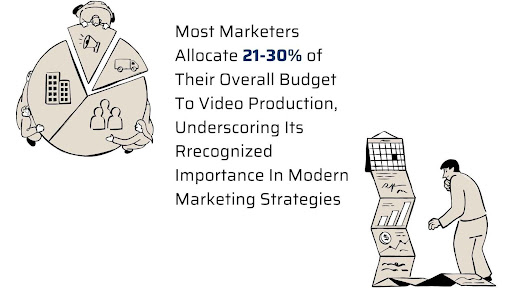
Budgeting and Resource Allocation
Is it possible to stay on budget, on time, and on brand? With the right workflow, yes! Let’s show you how!
- Assess your budget
Check the overall budget for your video production project.
- Allocate resources
Divide your budget into various aspects of the production, such as
→ Equipment
→ Crew
→ Location fees
→ Post-production costs
- Create a contingency plan
Be ready for unexpected expenses by setting aside a contingency fund.
Relatable Read: Essential Video Production Equipment: Everything You Need To Know To Get Started
Assemble the Team
Teamwork makes the dream work, but solo work makes, well, bloopers! So assembling a team plays a vital role in making your video production process effective. Some key aspects of maintaining a team are:
- Identify key roles
Have a clear idea about the roles needed for your production, such as director, producer, cinematographer, editor, and sound engineer.
- Hire talented professionals
Look for experienced and skilled individuals who have a knack for video production.
- Build a collaborative team
Try to create a positive and collaborative work environment among team members.
Storyboarding and Script Development
Video production without a script? That’s just a camera staring awkwardly at people! Not just the script; storytelling is to video production what plot twists are to movies—without them, it’s just boring. So the role of storytelling and script is almost clear, right? Then, to achieve your brand growth through storyboarding and script development, follow some important steps.
- Create a storyboard
Visualize your video by creating a storyboard that outlines the key scenes and shots.
- Develop a script
Write a detailed script that includes dialogue, action, and camera angles.
- Seek feedback
Get feedback from your team and others to ensure the script is clear, engaging, and aligned with your project objectives.
Production: Managing the Filming Process
Production is what takes your video from ‘meh’ to ‘wow,’ without needing a Hollywood budget. The production stage of filmmaking is where the vision of the project comes to life. It needs
- Careful planning
- Coordination
- Problem-solving
To ensure a smooth and successful shoot.
Relatable Read: The Essential Video Production Guide: Beginners & Professionals (2024)
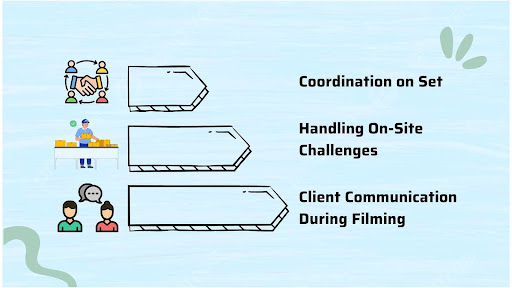
Coordination on Set
Coordination on set is like duct tape—it holds everything together. So it plays an enormous role in making video production smooth and successful.
- Team management
A professional crew is necessary for the shoot to be successful. To get the desired effects, the director, producer, sound engineer, cinematographer, and other team members must collaborate flawlessly.
- Equipment management
For the shoot to go smoothly, all required equipment must be present and in working order on the set. This covers props, lighting, sound, and camera setup.
- Scheduling
A meticulously arranged shooting schedule is necessary to keep things moving forward and prevent setbacks. When planning the timetable, considerations including site availability, actor schedules, and meteorological conditions should be made.
Handling On-Site Challenges
In video production, the only thing more important than the camera is your ability to improvise. So handling the challenges has become an integral part of project management.
- Technical difficulties
Be ready to troubleshoot any technical issues, such as malfunctioning equipment or software, that may come up while filming.
- Unexpected changes
Be nimble and adaptive to unforeseen set changes, including variations in the weather or site accessibility.
- Contingency planning
Make sure you have a backup plan ready to handle unforeseen circumstances and keep the shoot moving forward.
Client Communication During Filming
- Regular updates
Notify the client of any challenges or modifications that may develop as the shoot moves forward.
- Seek feedback
Actively seek feedback from the client throughout the filming process to ensure that their vision is being realized.
- Maintain open communication
To establish trust and a productive working relationship, be transparent and honest in your interactions with the customer.
Post-Production: Finalizing and Delivering the Video
The last step in the video production process is post-production, which is where the unfinished film is refined and made into a polished final product. There are multiple crucial milestones in this stage:
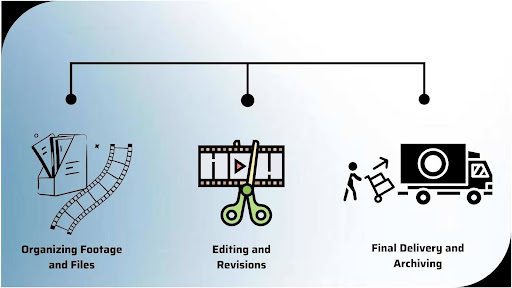
Organizing Footage and Files
- Create a project folder
Put all of your audio and video files in a project folder with a clear label.
- Label and categorize files
To make it simple to differentiate between various clips and materials, use a naming pattern.
- Back up your files
Make regular backups of the project’s files to guard against losing data.
Editing and Revisions
- Review and select footage
Select the finest footage for your final video.
- Assemble the footage
Put the videos in a sensible order and offer scene transitions.
- Add audio and music
Include voiceovers, sound effects, and background music, among other suitable audio components.
- Color correction and grading
To get the right visual style, adjust the footage’s brightness, contrast, and color.
- Incorporate special effects
To improve your video’s visual appeal and storyline, add animations or visual effects.
- Seek client feedback
Show early versions of the film to the customer to get their input and make any required changes.
- Iterate and refine
Based on input from the client and your artistic perspective, keep editing and improving the video.
Final Delivery and Archiving
- Final touches
Add any last details, such as logos, credits, and titles.
- Export the video
Export the video with the resolution and format that you choose (MP4, H.264, for example).
- Deliver the video
Deliver the final clip to the consumer in the format that was decided upon.
- Archive project files
Save a copy of the project files in case they change or are needed in the future.
Moreover, for the best deals in video production, check out LocalEyes. LocalEyes Video production brings your brand’s story to life with cinematic quality and creative flair. From concept to final cut, LocalEyes captures moments that matter.
Ready to make your vision a reality? Then wait no more. Contact LocalEyes today!
Key Project Management Tools for Video Production
It takes coordination, teamwork, and effective communication to handle the intricacies of video production. Thankfully, there are some effective project management tools available to help you organize your work and maintain team focus. We’ll examine three well-liked choices below that are well-suited to the video-producing process:
Trello: Your Visual Collaboration Canvas
Trello presents a visual and user-friendly project management solution. Imagine a virtual whiteboard with numerous sticky notes, each of which stands for a different task. These digital notes—also referred to as “cards”—can be moved about a “board,” which represents the pre-production, filming, and post-production stages of a project.
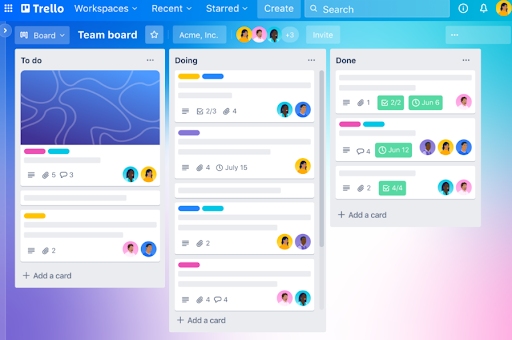
Key Features for Video Production:
- Board and Card Customization: Personalize each card with information such as task descriptions, deadlines, allocated team members, and checklists. Make distinct boards for each project.
- File Attachments: For convenient access and teamwork, attach pertinent files directly to cards, such as storyboards, films, and scripts.
- Labeling and Commenting: Classify jobs using labels and include comments to encourage team discussion and feedback.
- Power-Ups: Boost Trello’s capabilities by integrating it with other programs, such as Google Drive and Dropbox, to facilitate file sharing.
Benefits for Video Production Teams:
- Visual Overview: See your project timeline clearly and see any possible bottlenecks.
- Better Communication: With consolidated information access and real-time task updates, teams can collaborate more easily.
- Improved Organization: Effortlessly manage team member assignments, deadlines, and project deliverables.
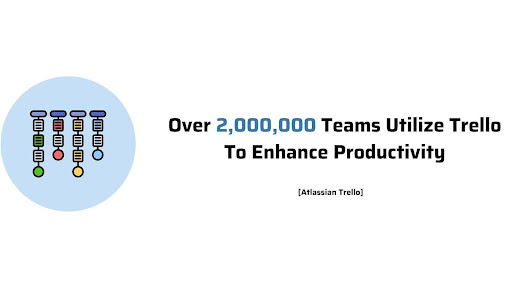
Trello is an excellent choice for:
- Teams producing videos on a smaller scale are looking for a simple, graphic project management solution.
- Teams on a tight budget, since Trello provides a basic feature-rich free plan.
Monday.com: Streamlining Your Video Production Workflow
Monday.com is a platform that allows you to customize it and offers robust automation and data visualization features, taking project management to the next level. It makes it simple to establish organized processes, keep tabs on developments, and keep an eye on project schedules.
Key Features for Video Production:
- Automated Workflows: Create prompts to assign tasks to team members, advance them through stages automatically, and produce reports when they’re finished.
- Customizable Views: For the best planning and scheduling, select the view you wish to use for your project, such as calendar view, Gantt charts, or Kanban boards.
- Integrations: Monday.com creates a central center for all of your project needs by integrating with a variety of video editing and collaboration applications in a smooth manner.
- Reports and Dashboards: Create informative dashboards with up-to-date information on team performance, resource allocation, and project status.
Benefits for Video Production Teams:
- Enhanced Efficiency: For improved time management, automate repetitive chores and simplify your workflow.
- Data-Driven Decision Making: Throughout the production process, use thorough reports to gain insights that will help you make wise decisions.
- Better Client Communication: To keep clients updated on developments and uphold transparency, share project dashboards with them.
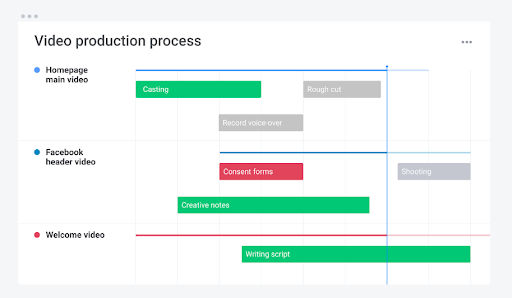
Monday.com is ideal for:
- Large-scale video production initiatives that call for intricate reporting and sophisticated procedures.
- Teams that are searching for a feature-rich platform with advanced automation features for project management.
Frame.io: Streamlining Collaboration in Video Review and Feedback
In particular, Frame.io supports the group evaluation of video content. It enables smooth video uploads, frame-by-frame annotation, and threaded conversations with clients and team members.
Key Features for Video Production:
- Secure Video Uploads: Upload your edited videos to Frame.io’s secure portal for team evaluation and comments.
- Annotated Feedback: For accurate communication on particular adjustments, directly add timestamped notes to video frames.
- Threaded Discussions: Use threaded comments to have in-depth discussions on particular video points.
- Version Control and History: Maintain a thorough history and version control for every video edit to make sure no changes are missed.
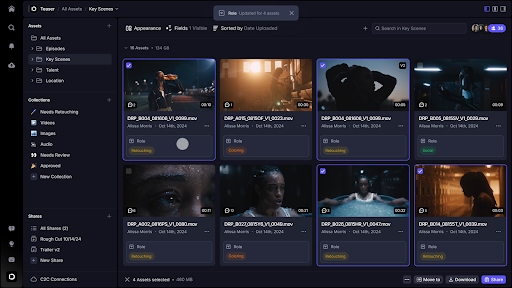
Benefits for Video Production Teams:
- Easy Review and Feedback: Use a specialized platform made for video collaboration to streamline the review and feedback procedure.
- Enhanced Clarity of Communication: Reduce misunderstandings and uncertainty by giving accurate feedback that is accompanied by timestamps and remarks.
- Improved Cooperation: Provide a centralized platform for team members’ and clients’ comments and collaborative editing.
Frame.io is a perfect choice for:
- Teams working on different projects or remotely editing videos together.
- projects that call for in-depth comments and careful discussion of certain video edits.
Wrap Up!
Video production needs to be managed well in order to be successful. You can produce high-caliber movies on schedule and within your allocated budget, optimize workflow, and effectively manage resources by following the instructions provided.
Get personalized advice on streamlining your video production projects—contact us today!
Frequently Asked Questions (FAQs) : Video Production Project Management
What is project management for video production?
The technique of organizing, planning, and supervising a film’s creation from beginning to end is known as video production project management.
Which stages are essential for the management of a video production project?
Pre-production, production, post-production, and completion are the crucial phases in managing a video production project.
How can a video production process be managed effectively?
A video production project has to have well-defined objectives, a thorough project plan, good team communication, and frequent progress monitoring to stay on course.
Which tools support project management in video production?
Cloud storage, collaboration platforms, and project management software are tools that make managing video production projects easier.
Which four phases make up video production?
Pre-production, production, post-production, and delivery are the four phases of video production.
How does a project manager for videos work?
The entire video production process, from preparing a budget to scheduling and delivery, is under the control of a project manager.

Founder at LocalEyes Video Production | Inc. 5000 CEO | Emmy Award Winning Producer


